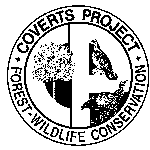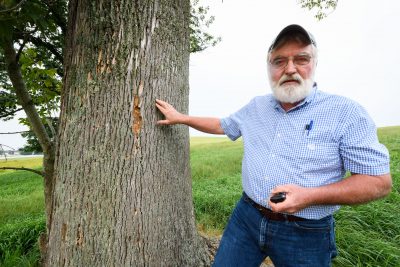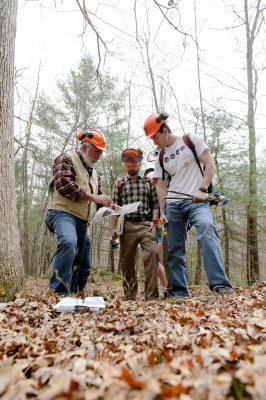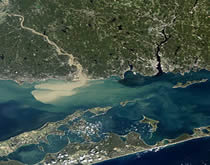Join Us
Can You Spare a Few Hours a Month for Forests and Wildlife?
If you would like to donate a few hours of your time each month for forests and wildlife, there are several programs that need your help and energy.
The Meskwaka Tree Project: Urban and Community Forestry
The Meskwaka Tree Project (Mesk-wa-ka is an Algonquian word meaning Always Green) is a training and outreach program for urban and community forestry citizen volunteers. As a component of the University of Connecticut Cooperative Extension System urban and community forestry program, the Meskwaka Tree Project provides training, resource materials and support to selected volunteer community leaders, innovators and activists so they may develop new or enhance existing programs and organizations. For further information on how you may apply to the Meskwaka Tree Project, or for subscriptions to the newsletter: call (860) 409-9079, or write to: Meskwaka Tree Project, UConn Extension, Exchange Building - Suite 262, 270 Farmington Avenue, Farmington, CT, 06032. Or email robert.ricard@uconn.edu

The COVERTS Project in Connecticut: A Forest Wildlife Education Program
Education Through Demonstration
The Coverts Project began simultaneously in Vermont and Connecticut in 1983. Since that time it has spread to 11 other states across the northeastern U.S. Its goals are to teach forest owners how good forest stewardship can:
- Earn the woodland owner a long-term financial return, and
- Improve the health and productivity of both the forest and the wildlife that live in it.
Actively managed demonstration areas are used as outdoor classrooms during our annual, in-depth Coverts Project training seminar and follow-up workshops. Each year, a select group of 30 woodland owners and/or environmentally concerned individuals are accepted to participate in the three-day training seminar, held at the beautiful and remote Yale Forestry Camp in Norfolk, CT. There they learn about different types of Connecticut forests and about where, how, and why they grow as they do. They learn about different wildlife species, their needs, and how to provide for them. They learn about the many natural resource professionals and organizations available to help them. And they learn how to put this knowledge to work on their own woodland.
The seminar (meals, lodging, training, and reference materials), periodic follow-up workshops, and the quarterly Coverts Project Newsletter are free to participants. All costs are paid for by the Ruffed Grouse Society, a nonprofit organization dedicated to forest wildlife conservation.
In exchange, participants agree to become Coverts Project Cooperators, to return to their communities and share what they've learned with others. Specifically, cooperators agree to:
-
- Develop a sound forest and wildlife management plan for their own woodland and/or woodland which they are involved in managing;
- Maintain for at least one year an up-to-date set of reference materials (provided by the Coverts Project) and be available to answer questions other landowners have;
- Make an active effort to reach out to and motivate other woodland owners in their community.
- Through this network of informed individuals, thousands of landowners are learning about and beginning to practice sound forest and wildlife conservation.
Breaking a Cycle of Abuse and Neglect
For over 300 years, Connecticut's forests have been cutover, burned and otherwise abused for human profit. Decades of neglect have alternated with intense periods of indiscriminate cutting and abuse. Genetic depletion, poor health and productivity, and loss of wildlife species have been the result. Today, rapid development and land fragmentation, as well as poor cutting practices, continue to threaten our forest and wildlife resources.
Coverts Project Cooperators are working to break this vicious cycle. They know the time has come when we must recognize the forest and the land as a community of which we are a part, rather than a commodity we are free to abuse. Together, by taking the time to learn and to share their knowledge with others, they are making a difference.
Will You Join Us?
Each year, woodland owners and others involved with the care of wooded properties are invited to apply for one of the 30 slots available in the annual September seminar. We look for people who are, or who have the potential to be, informal educators in their communities: people who others will come to when they have questions about forests or wildlife; people who can find time in their busy schedules for the seminar and some volunteer activities during the coming year; people who want to get to know and to work with natural resource professionals from around the state; people who would like their own woodland to be healthy and productive; people who care about Connecticut's forests and the wildlife that live in them.
To learn more about the Coverts Project or to apply to become a cooperator:
Write us at:
The Coverts Project
The University of Connecticut
Cooperative Extension System
1066 Saybrook Road, PO Box 70
Haddam, CT 06438-0070
Phone toll-free 1-888-30WOODS
Or email: thomas.worthley@uconn.edu



The Lower CT River & Costal Region Forest Stewardship Initiative
The purpose of the Lower CT River & Coastal Region (LCR&CR) Stewardship Initiative is to inform and educate woodland owners in the lower CT River and coastal region about forest stewardship, planning and management through various workshops and events. The woodland resources in the Lower CT River and Coastal Region are important to the environmental health and character of the region and helping to make the stewardship of your woodlands a more rewarding and satisfying task is the priority for these events. The mission of the LCR&CR Forest Stewardship Initiative is to provide you, the woodland owner, with the knowledge to manage your forest land using all the resources that are available to you. The LCR&CR Stewardship Initiative is a collaboration between the University of Connecticut Cooperative Extension Forestry Program and the Lower CT River Valley Council of Governments (formerly the Connecticut River Estuary Planning Agency), and is supported by the US Forest Service, the USDA Natural Resource Conservation Service, and the CT-DEEP Forestry Division. Thanks are also extended to Regional School District 17 for their cooperation in providing a demonstration site for some events.
PROGRAMS:
Some of the programs held early this Spring included:
- Assistance Programs for Forest Stewardship Planning and Activities
- Chain Saw Safety and Use
- Small-scale and Low Impact Forest Harvesting Methods for Small Woodland Owners
- Controlling Invasive Shrub Species in Forests and Edge Habitats
If your organization or group would like to host a program with a forest or wildlife topic, do not hesitate to contact us.
For more information, please direct your comments and questions to one of those listed below:
Thomas Worthley
Stewardship Program Forester
Middlesex County Cooperative Extension Center
1066 Saybrook Road, Box 70
Haddam CT 06438-0070
Tel: (860) 345-4511
Fax: (860) 345-3357
Email: thomas.worthley@uconn.edu
Margot Burns
Environmental Planner
Connecticut River Estuary Regional Planning Agency
Tel: (860) 388-3497
Fax: (860) 395-1404
Email: mburns@crerpa.org
